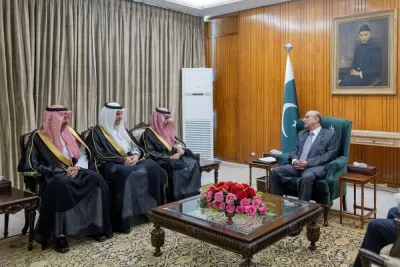A cross section of the residents said it seems the siege nations have run out of ideas to slander Qatar and they are now resorting to cheap propaganda through songs and music. "The next may be a dance number," one Arab expatriate said.
The five-minute music video, sang by seven Arab singers -- five Saudis and two Iraqis-- has drawn considerable ire and adverse reaction on the social media, with users describing it as a cheap and an unacceptable way of using arts to slander a neighbouring country and incite hatred among people.
Qatar officially dismissed the video as defamatory, AFP said.
"We stick to our ethics and stay away from the minor acts, and let them slander using their media to disgrace others," Qatari foreign ministry official Ahmed bin Saeed al-Rumaihi tweeted.
The song, which is a mix of scorn and threat, was released by Rotana, an entertainment firm primarily owned by Saudi billionaire Prince Alwaleed bin Talal.
Local Arabic daily Al Sharq reported yesterday that the five-minute video was enough to wipe away the good record of the singers who used to be the most celebrated in the GCC region. It is also well-known that some of them had sung in praise of Qatar and participated in a number of events in Doha, where they used to enjoy big fans and good money.
Qatari composer Matar Ali al-Kuwari told the daily that the blockading countries have exhausted all ways to fight Qatar , including the pulpits, social media users and are now misusing art and artists. He described the singers as mercenaries of Saudi Art, and the song to be a black spot on their record. 'They have been already rejected by both the Saudi and Qatari fans."
He further said that those singers have forgotten, or seemed to forget, that Qatar used to host them, honour them, and give them a wider audience.
Qatari artist Fahd al-Hajaji said that art and music should be used as a means for promoting understanding among people not to spread hatred among them.
He said: "We have not been affected by the blockade, which has entered the fourth month, so we will not be affected by a song," describing the song as lamentable artistic bankruptcy.
Qatari artist Ali Abdulsatar pointed out that such approaches are not ethically accepted by Qataris, as it could have been easy to respond to them but Qatari principles would not allow slipping into such degradation. He also stressed that most of the artists who sang the song used to enjoy the generosity of Qatar and sang in love of the country.
Qatari artist Issa al-Kubaisi said that using art in this way in political disputes was really regrettable and the only losers were the singers who have been deprived of their popularity.
The song has generated general dissatisfaction and rejection among social media users, who expressed their disappointment at such unbecoming practices.
Saudi Arabia as well as the United Arab Emirates, Egypt and Bahrain cut ties with Qatar in June, accusing it of funding extremist groups. Doha denies the charges.
The four Arab states have imposed an embargo on Qatar, recalling their diplomats and banning the country from using their airspace or ports.

A screen grab of the YouTube music video
The recently launched Saudi music video "Allem Qatar" (Tell Qatar) is another proof that the blockade against Qatar has completely failed and the siege has only strengthened the resolve of the country's residents.


